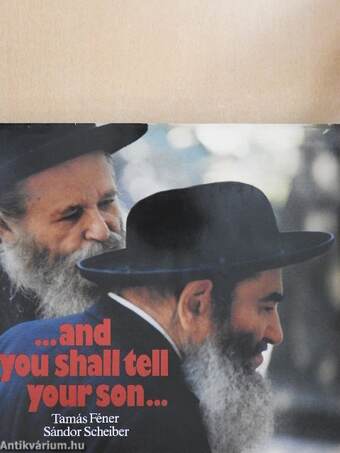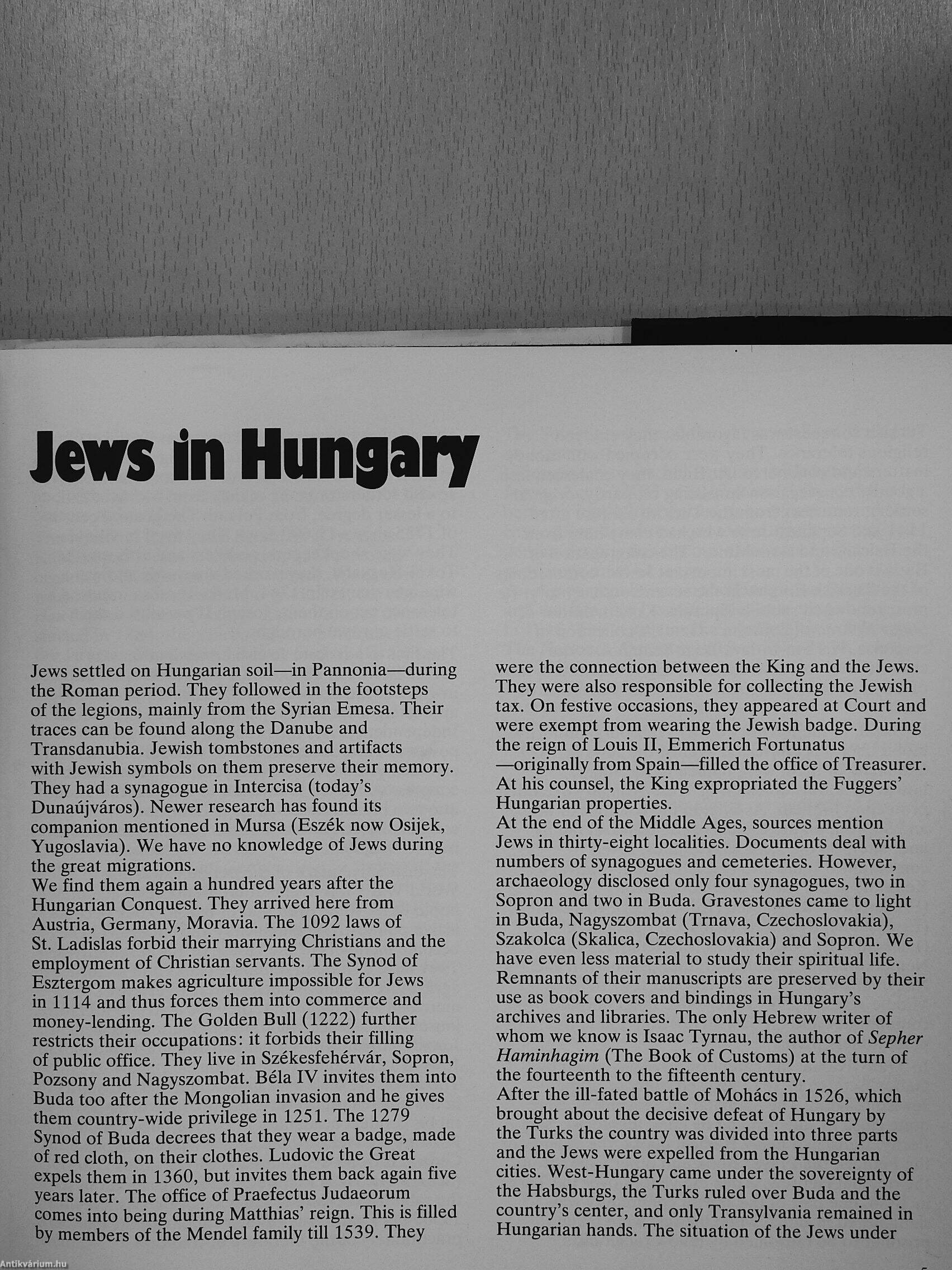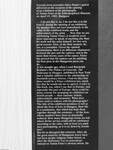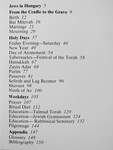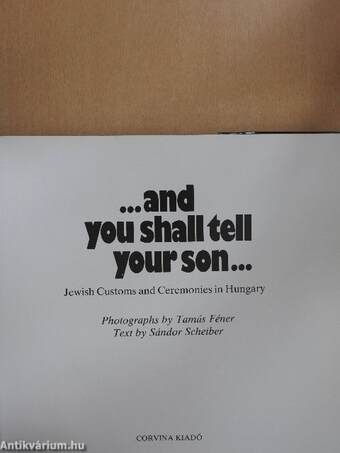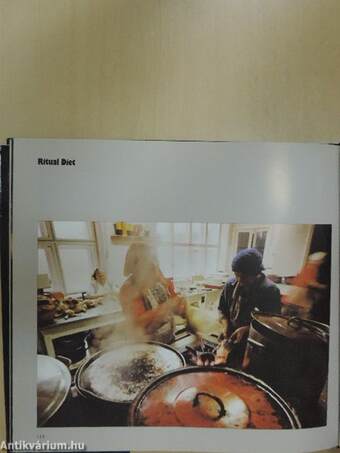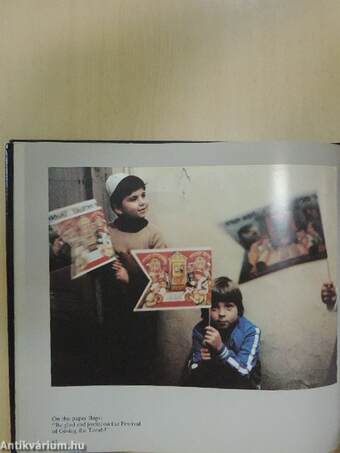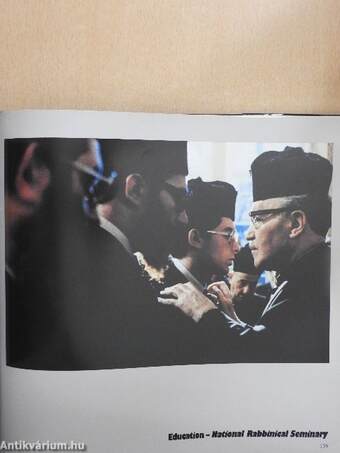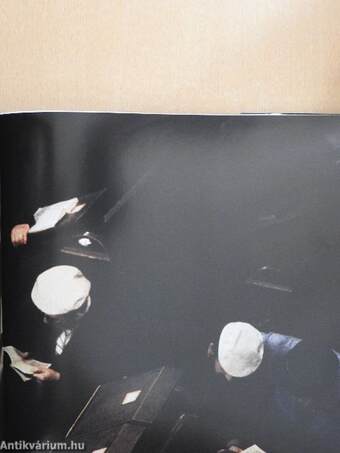1.067.288
kiadvánnyal nyújtjuk Magyarország legnagyobb antikvár könyv-kínálatát

VISSZA
A TETEJÉRE
JAVASLATOKÉszre-
vételek
...and you shall tell your son...
Jewish Customs and Ceremonies in Hungary
| Kiadó: | Corvina Kiadó |
|---|---|
| Kiadás helye: | Budapest |
| Kiadás éve: | |
| Kötés típusa: | Vászon |
| Oldalszám: | 155 oldal |
| Sorozatcím: | |
| Kötetszám: | |
| Nyelv: | Angol |
| Méret: | 23 cm x 24 cm |
| ISBN: | 963-13-1850-8 |
| Megjegyzés: | Színes fotókkal. |
naponta értesítjük a beérkező friss
kiadványokról
naponta értesítjük a beérkező friss
kiadványokról
Előszó
TovábbFülszöveg
Excerpts from journalist János Hajdú's speech delivered on the occasion of the opening of an exhibition of the photographs of Tamás Féner at the Ethnographical Museum, on April 19, 1983, Budapest. . . . I do not like it, no, I do not like it in the least if, during the opening of an exhibition, the speaker does not turn immediately to the value of the exhibited works and the achjevement of the artist. . . Now that we are celebrating Tamár Féner, it would be even more improper to speak of anything else than his work and the artist himself, for two very good reasons. First, in the final analysis, he, too, is a journalist. Given the optimál circumstances, there is no difference whatsoever between the pen and the camera; and in the more than twenty years of his career, Féner has proved that his camera can do anything the best pens in the Hungárián press can I do . . . ! A few months ago, when I read Randolph Braham's The Politics of Genocide. The Holocaust in Hungary, published in New... TovábbFülszöveg
Excerpts from journalist János Hajdú's speech delivered on the occasion of the opening of an exhibition of the photographs of Tamás Féner at the Ethnographical Museum, on April 19, 1983, Budapest. . . . I do not like it, no, I do not like it in the least if, during the opening of an exhibition, the speaker does not turn immediately to the value of the exhibited works and the achjevement of the artist. . . Now that we are celebrating Tamár Féner, it would be even more improper to speak of anything else than his work and the artist himself, for two very good reasons. First, in the final analysis, he, too, is a journalist. Given the optimál circumstances, there is no difference whatsoever between the pen and the camera; and in the more than twenty years of his career, Féner has proved that his camera can do anything the best pens in the Hungárián press can I do . . . ! A few months ago, when I read Randolph Braham's The Politics of Genocide. The Holocaust in Hungary, published in New York and a valuable addition to the scholarship on twentieth-century history, I had no idea that there would be a Féner exhibition too, much less that he would ask me to open it. I refer to this book, too, when I say that in Europe, and especially this part of Europe, there could be many reasons for arranging an exhibition on Jewish people - their customs, beliefs, achievements, (and memories. What does Féner wish to achieve with his photographs? The title of his exhibition promises to teli us about the lives of Jews in Hungary, their life in a community, that which has kept them together through the centuries - of the Jews whose numbers have been so drastically reduced. How many Hungárián towns are left where divíne service could still be celebrated according to the rules, with at least ten aduit men participating, as it is set down by Jewish law? But let us disregard this criterion. After all, the great majority of Hungárián Jewry have not been deeply religious either before or aftér the Holocaust. Let us concentrate instead on Tamás Féner's obvious intent. He VisszaTémakörök
- Idegennyelv > Idegennyelvű könyvek > Angol > Művészetek > Fotóművészet
- Idegennyelv > Idegennyelvű könyvek > Angol > Művelődéstörténet
- Idegennyelv > Idegennyelvű könyvek > Angol > Néprajz
- Művelődéstörténet > Kultúra > Története
- Művelődéstörténet > Kultúra > Kultúrantropológia
- Néprajz > Tárgyi néprajz > Életmód > Magánélet szokásai > Vallás
- Művészetek > Fotóművészet > Albumok > Tematikus
- Művészetek > Fotóművészet > Idegen nyelv > Angol
- Művészetek > Fotóművészet > Témái > Egyéb
- Idegennyelv > Idegennyelvű könyvek > Angol > Szociológia > Társadalmi csoportok > Kisebbségek > Zsidóság
- Szociológia > Társadalmi csoportok > Kisebbségek > Zsidóság > Egyéb
- Idegennyelv > Idegennyelvű könyvek > Angol > Vallás > Zsidóság, Judaizmus
- Vallás
- Vallás > Zsidóság, judaizmus
Megvásárolható példányok
Nincs megvásárolható példány
A könyv összes megrendelhető példánya elfogyott. Ha kívánja, előjegyezheti a könyvet, és amint a könyv egy újabb példánya elérhető lesz, értesítjük.



